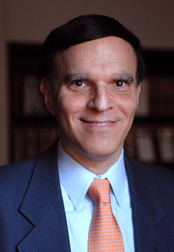
All of us who knew James Q. Wilson have much to be grateful for.
Appreciations of a distinguished academic passing from the scene tend to be confined to professional journals of often narrow specialty, and a few paragraphs on the newspaper obituary page. Such is his impact as a scholar, teacher, and public intellectual, that James Q. Wilson’s death yielded something quite different: an extraordinary, indeed, perhaps unparalleled stream, across academic disciplines and across the political spectrum, of serious commentaries, tributes from social scientists, decisionmakers, journalists, and editorial writers. The range of Professor Wilson’s interests were capacious, and for years to come, his ideas will stimulate discussion and further inquiry. The Regulatory Review brings together students of James Q. Wilson focused on one area of his concerns – bureaucracy and regulation. As his Ph.D student, teaching assistant and research assistant at Harvard, and as a contributor to The Politics of Regulation, I had the privilege of learning much from Professor Wilson. My understanding of the administrative process, on how decisions are made, owes much to his influence. I offer a few words about what I learned from him and my debt to him.
Vitally concerned with ideas, Professor Wilson eschewed grand social science theories. He believed that to label is to ignore, that politics, indeed governing, can be messy, and not well-suited to formal models devoid of a recognition of the interplay of forces that explain decisionmaking. As a teacher and scholar, he was not content to look at a data set and simply infer what the criteria for decisions were. Rather, he pressed for an empirical inquiry that involved an immersion into the organizations themselves – an inquiry that he himself undertook in such works as Varieties of Police Behavior and The Investigators. He was concerned with behavior and what drives behavior. In Bureaucracy – the greatest book written on the U.S. experience – he elegantly provides a framework for explaining outcomes through an examination of internal factors – mission, goals, managers, operators, tasks, autonomy versus coordination, power structure – and external factorssuch as legislatures and courts. In The Politics of Regulation, Professor Wilson was interested in the relationship between private power and public purpose, in testing empirically a variety of extant theories, such as the “capture” theory, by studying how goals are established, conflict resolved or managed, standards determined, and policy implemented. As he wrote, subtly critiquing overbroad theories: “Regulatory laws can have a variety of political causes and…it is necessary, in order to understand why regulation occurs, to specify the circumstances under which one or another cause will be operative.” He approached his examination of bureaucracy and regulation with a cool, analytical detachment that led him to follow the facts, whatever they might be.
My own writings reflect the Wilson approach to the study of organizations. For example, in Regulatory Bureaucracy, I explored the mix of internal and external factors that account for the antitrust caseload decisions of the Federal Trade Commission. I found unsatisfactory standard accounts that were grounded in capture theory, economic and power-maximizing models. Rather, onsite investigation told a different story, of a caseload that could largely be explained by clash of two professions – lawyers and economists – and how the balance struck between professionals with different norms and goals often significantly affected the definition of antitrust policy.
In Institutional Disability, I assessed the role of national political institutions over time in the unfolding of policy. Again, the influence of Wilson could be felt as I wrote:
“Policymaking is dynamic and complex; it can be conceived as a continuum of institutional processes, sometimes acting independently, but often interacting in subtle and perhaps not always conscious ways to influence the behavior of other processes. It is the product of individual with different incentives and professional norms, operating inside and outside government. If results are to be properly assessed and prescription made, it is essential to examine the issue networks – those institutional arrangements whose interaction yields outcomes.”
And, finally, in my work on courts and Congress I have sought to appreciate how each institution operates through empirical inquiry.
Now a few words about James Q. Wilson as classroom teacher and as mentor. I have never met a more articulate, precise, human being than James Q. Wilson. As a classroom presence, he was commanding and graceful, a professor who thought and spoke in perfectly formed paragraphs, often without notes, about complicated subjects. He had an ability to make the driest subject come alive – even tasks and operators became engaging subjects. Perhaps some of that presence owes something to his debating skills. James Q. Wilson was a champion debater at Redlands; more than five decades later, a law clerk of mine, who had gone to Redlands, told me that Wilson was still remembered for his debating prowess. Professor Wilson was refreshingly honest. When students would ask him questions to which he had no answer that satisfied his high standards, he would say something like: “I don’t know the answer to that question,” or “We have no conclusive evidence to support that proposition.” He was confident and modest at the same time. He never drew attention to his own prodigious gifts; all of us who came in contact with him could not help but notice his brilliance.
As a dissertation adviser, James Q. Wilson was ideal. Amidst all of his many responsibilities, he would always find time to read and respond to drafts with incisive critiques in just a few days. He impressively found funds so that his students could undertake their research projects – I don’t recall ever having to fill out a grant application. As I pursued one job or another, his backing was always important. The Politics of Regulation, consisting of the work of his students, is testament to the invaluable time and support that he gave to each of us. And, his mentorship and friendship continued over the years. I would look forward always to his and his wonderful life partner Roberta’s trips to New York, and to exchanging holiday cards and e-mails with him about this or that subject.
At a time when discourse is often uncivil, James Q. Wilson, by his example, was a model of how discussion should occur. He was engaged on the level of ideas, he was never personal or partisan, and he was always polite. Political difference mattered little; what mattered more was integrity and friendship. As a graduate student, I came to know another mentor, Daniel P. Moynihan, through James Q. Wilson. Watching them together, friends of different political persuasions, was something I will always cherish – the rapid exchange of ideas, the witty repartee, the complete enjoyment of each other’s company. As Professor Wilson would write about his relationship with the Moynihans, “what is perhaps the greatest value of life in a free society ruled by a limited government: Politics is not that important, and infinitely less important than friendship and honor and decency and fun.”
All of us who knew James Q. Wilson have much to be grateful for.
This essay is part of the Penn Program on Regulation’s online symposium, Remembering James Q. Wilson.




